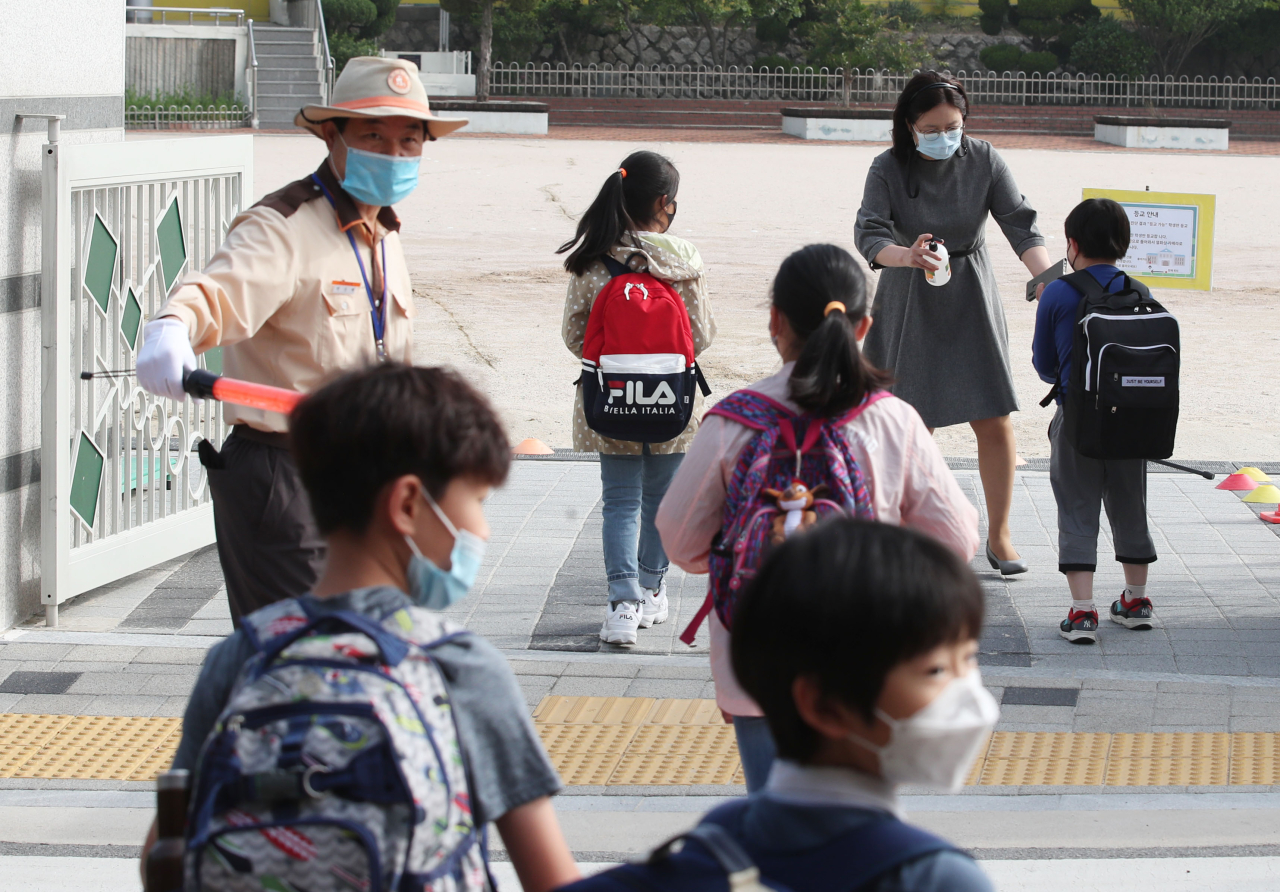Last group of pupils to return to school Monday in final phase of reopening amid pandemic
By YonhapPublished : June 7, 2020 - 11:06

More South Korean pupils are set to return to classes Monday in the final phase of the government's reopening plan amid growing anxiety over a second wave of new coronavirus infections in Seoul and the adjacent cities.
A total of 57 new coronavirus cases were added Sunday, the most in nine days, bringing the total caseload to 11,776. Among the new patients, 52 were from the greater Seoul area where nearly half of the country's total population of 52 million live.
The country will wrap up its four-phased reopening of schools nationwide Monday with 5.95 million pupils attending in-person classes.
The reopening of schools has been testing the government's pandemic response and quarantine system in the face of the highly infectious disease after the country began to ease social distancing guidelines in early May.
And schools seem to be less affected by COVID-19 than expected.
Data from the education ministry released Friday showed that only a handful of infections have been reported at schools -- six students and four school officials -- since schools began to reopen on May 20.
The ministry said none of them contracted the virus at school. They either found out they had been infected with the virus only after coming to school, or they showed COVID-19 symptoms at school and subsequently tested positive.
The bigger concern seems to come from outside of school boundaries, according to state data.
While schools shut down for nearly three months to limit the spread of the novel coronavirus, the country's sprawling private educational institutes, such as cram schools, or "hagwon" in Korean, largely stayed open despite the government's repeated warnings against it.
According to the ministry, 78 COVID-19 patients have been confirmed at 42 private institutes since February. Some of them were found to have lax quarantine measures in place, putting young students and teachers there at risk.
That the country continues to see small infection clusters traced to religious gatherings, nightclubs and a distribution center in Seoul and its surrounding area is also raising a red flag for the potential spread at schools.
Also among the most recently identified clusters was a Seoul-based health product retailer, which specializes in door-to-door sales for mostly elderly citizens.
To prevent an outbreak at schools, the ministry has allowed each school to run a different -- sometimes rather complex -- schedule designed to maintain social distancing.
They have implemented staggered lunches, adjustments to student attendance, split sessions, reduced class time and a mix of online and offline classes.
As of 10 a.m. Friday, 514 schools, or 2.5 percent of the country's 20,902, closed as a precautionary measure. The figure was 838 on May 28, a day after schools reopened for more than 2.3 million pupils in the second phase of reopening.
Oh Kyung-hee, a mother of two girls in Seoul, said her oldest daughter will be on a one-week-on, two-weeks off schedule, while her younger one will go to school once a week.
Her 13-year-old eldest daughter is a first-year middle school student, and the younger, 12, a sixth grader in elementary school. They are among the year groups, alongside fifth graders at elementary school, that belong to the fourth phase of reopening.
Asked if it is worth taking the trouble and feeling anxious about her daughter going to school once a week, she said, "I think it is still very important for them to meet friends and teachers in person and to feel connected to them and solidarity."
"Staying at home all day and watching online classes sometimes feel like just killing time for them," she said, adding, "Schools are safer than hagwon. They are less crowded, more spacious, and teachers and school officials stay highly alert over the danger posed by the virus."
The government recognizes parental concerns over safety in hagwon and has moved to tighten its grip.
It plans to revise a relevant law, based on which the education ministry can punish a private academy that fails to abide by strict quarantine measures with a fine or a forcible business closure.
It is also mulling introducing quick response (QR) code-based entry logs there to allow easy tracing of potential COVID-19 patients. It has already been running the pilot program at risky venues, including karaoke facilities, bars and churches.
"There will come a time when kids can go to school five days a week," Oh said, "if everyone tries their best to stay vigilant." (Yonhap)







![[KH Explains] Hyundai's full hybrid edge to pay off amid slow transition to pure EVs](http://res.heraldm.com/phpwas/restmb_idxmake.php?idx=644&simg=/content/image/2024/04/18/20240418050645_0.jpg&u=20240419100350)







![[From the Scene] Monks, Buddhists hail return of remains of Buddhas](http://res.heraldm.com/phpwas/restmb_idxmake.php?idx=652&simg=/content/image/2024/04/19/20240419050617_0.jpg&u=20240419175937)

![[KH Explains] Hyundai's full hybrid edge to pay off amid slow transition to pure EVs](http://res.heraldm.com/phpwas/restmb_idxmake.php?idx=652&simg=/content/image/2024/04/18/20240418050645_0.jpg&u=20240419100350)

![[Today’s K-pop] Illit drops debut single remix](http://res.heraldm.com/phpwas/restmb_idxmake.php?idx=642&simg=/content/image/2024/04/19/20240419050612_0.jpg&u=)